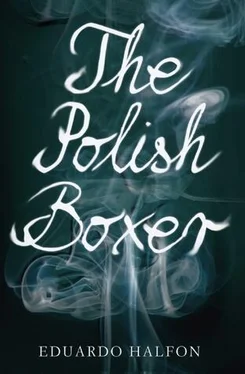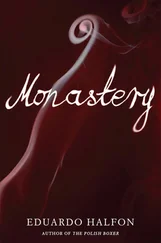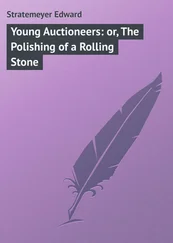Eduardo Halfon - The Polish Boxer
Здесь есть возможность читать онлайн «Eduardo Halfon - The Polish Boxer» весь текст электронной книги совершенно бесплатно (целиком полную версию без сокращений). В некоторых случаях можно слушать аудио, скачать через торрент в формате fb2 и присутствует краткое содержание. Год выпуска: 2012, Издательство: Bellevue Literary Press, Жанр: Современная проза, на английском языке. Описание произведения, (предисловие) а так же отзывы посетителей доступны на портале библиотеки ЛибКат.
- Название:The Polish Boxer
- Автор:
- Издательство:Bellevue Literary Press
- Жанр:
- Год:2012
- ISBN:нет данных
- Рейтинг книги:4 / 5. Голосов: 1
-
Избранное:Добавить в избранное
- Отзывы:
-
Ваша оценка:
- 80
- 1
- 2
- 3
- 4
- 5
The Polish Boxer: краткое содержание, описание и аннотация
Предлагаем к чтению аннотацию, описание, краткое содержание или предисловие (зависит от того, что написал сам автор книги «The Polish Boxer»). Если вы не нашли необходимую информацию о книге — напишите в комментариях, мы постараемся отыскать её.
marks the debut of a major new Latin American voice in English.
The Polish Boxer — читать онлайн бесплатно полную книгу (весь текст) целиком
Ниже представлен текст книги, разбитый по страницам. Система сохранения места последней прочитанной страницы, позволяет с удобством читать онлайн бесплатно книгу «The Polish Boxer», без необходимости каждый раз заново искать на чём Вы остановились. Поставьте закладку, и сможете в любой момент перейти на страницу, на которой закончили чтение.
Интервал:
Закладка:
While I was taking a piss, I noticed that, in spite of being a little drunk, I already had a slight erection. Then I washed my hands, thinking about my grandfather, about Auschwitz, about the five green digits tattooed on his forearm, which for all of my childhood I thought were there, as he used to tell me himself, so that he could remember his telephone number. And without knowing why, I felt a bit guilty.
I came back from the bathroom. I could hear Bob Dylan’s raspy voice. Tamara was singing. Yael had filled my glass up again and was flirting with a guy who seemed Scottish and was very possibly the owner of the bar. I sat watching Yael. She had a silver belly-button ring. I imagined her in military uniform, carrying a huge machine gun. I turned back and saw that Tamara was smiling at me while she sang. I could only imagine her naked.
I took a long drink until the glass was empty. An old campesino had come in to the bar and was trying to sell machetes and huipiles. I told Tamara that I was already late for a meeting but that we could get together the next day. Can you come from the capital? she asked. Of course, gladly, it’s a thirty-minute drive. All right, she said. I get out of class at six. Should we meet here again? Ken, I said to her, which means yes in Hebrew, and I half-smiled. I love your mouth, it’s shaped like a heart, she said, and grazed my lips with her finger. I said thank you, and told her that I loved when women grazed my lips with their fingers. Me too, Tamara murmured in her bad Spanish, and then, still in Spanish and baring her teeth like a hungry lioness, she added: But I like it better when men bite my nipples, and hard. I didn’t understand if she knew exactly what she was saying or if she was joking. She leaned toward me and I got chills when she gave me a soft kiss on my neck. With a shudder, I wondered what her nipples would look like, round or pointed, pink or red or maybe translucent violet, and standing up, I told her in Spanish that that was a shame, that when I do bite them, I bite them softly.
I paid for all the beers and we agreed to meet there the following evening, at six o’clock. I hugged her tightly, feeling something that couldn’t be named but that was as thick and distinct as the white smoke of the Vatican on a dark winter night, and knowing very well that the next day I wouldn’t be coming back.
The Polish Boxer
69752. That it was his phone number. That he had it tattooed there, on his left forearm, so he wouldn’t forget it. That’s what my grandfather told me. And that’s what I grew up believing. In the 1970s, telephone numbers in Guatemala were five digits long.
I called him Oitze, because he called me Oitze, which means something soppy in Yiddish. I liked his Polish accent. I liked dipping my pinkie (the only physical feature I inherited from him: these two curved little fingers, more warped every day) in his glass of whiskey. I liked asking him to draw me pictures, but he only actually knew how to draw one picture, quickly sketched, always identical, of a sinuous and disfigured hat. I liked the beet-red color of the sauce (chrain, in Yiddish) that he poured over his white ball of fish (gefilte fish, in Yiddish). I liked going with him on his walks around the neighborhood, the same neighborhood where one night, in the middle of a big vacant lot, a planeful of cows had crashed. But most of all I liked that number. His number.
It didn’t take me too long, however, to understand his telephone joke, and the psychological importance of that joke, and eventually, although nobody would admit it, the historical origin of that number. Then, when we went for walks together or he started drawing a series of hats, I would stare at those five digits and, strangely happy, play a game of inventing secret scenes of how he might have gotten them. My grandfather faceup on a hospital bed while, straddling him, an enormous German officer (dressed in black leather) shouted out the numbers one at a time to an anemic-looking German nurse (also dressed in black leather), who then handed him, one by one, the hot irons. Or my grandfather sitting on a wooden bench in front of a semicircle of Germans in white coats and white gloves, with white lights fastened around their heads, like miners, when suddenly one of the Germans stammered out a number and a clown rode in on a unicycle and all the lights shone their white light on my grandfather while the clown — with a big green marker, in ink that could never be erased — wrote that number on his forearm, and all the German scientists applauded. Or my grandfather standing at the ticket booth of a cinema, sticking his left arm in through the little round opening in the glass where they pass you the tickets, and on the other side of the window, a fat, hairy German woman setting the five digits on one of those stamps with adjustable dates like they use in banks (the same kind of stamps my dad kept on the desk in his office and that I liked to play with), and then, as if it was an extremely important date, stamping it hard and forever onto my grandfather’s forearm.
That’s how I played with his number. Clandestinely. Hypnotized by those five mysterious green digits that, much more than on his forearm, seemed to me to be tattooed on some part of his soul.
Green and mysterious until not so long ago.
In the late afternoon, sitting on his old butter-colored leather sofa, I was drinking whiskey with my grandfather.
I noticed that the green wasn’t as green as it used to be, but more of a diluted, pale, grayish color that made me think of something decomposing. The 7 had almost amalgamated with the 5. The 6 and the 9, unrecognizable, were now two swollen blobs, deformed and out of focus. The 2, in full flight, gave the impression of having moved a few millimeters away from the rest of them. I looked at my grandfather’s face and suddenly realized that in my childhood game, in each of my boyish fantasies, I had imagined him already old, already a grandfather. As if he’d been born a grandfather, or as if he’d aged once and for all at the very moment of receiving that number, which I was now examining so meticulously.
It was in Auschwitz.
At first, I wasn’t sure I’d heard him. I looked up. He was covering the number with his right hand. Drizzle purred against the roof tiles.
This, he said, rubbing his forearm gently. It was in Auschwitz, he said. It was with the boxer, he said without looking at me and with no emotion whatsoever and speaking in an accent no longer his own.
I would have liked to ask him what it felt like when, after almost sixty years of silence, he finally said something truthful about the origin of that number. Ask him why he had said it to me. Ask him if releasing words so long stored up produced some liberating effect. Ask him if words stored up for so long had the same taste as they rolled roughly off the tongue. But I kept quiet, impatient, listening to the rain, fearing something, perhaps the intense transcendence of the moment, perhaps that he might not tell me anything more, perhaps that the true story behind those five digits might not be as fantastic as all my childhood versions.
Oitze, pour me another drop, eh, he said, handing me his glass.
I did, knowing that if my grandmother came back early from her errands, I’d be in trouble. Since he started having heart problems, my grandfather drank two ounces of whiskey at midday and another two ounces before supper. No more. Except on special occasions, of course, like a party or wedding or soccer match or a television appearance by Isabel Pantoja. But I thought he was building up strength for what he wanted to tell me. Then I thought that, by having more to drink than he should in his current state of health, telling me what he wanted to tell could upset him, possibly too much. He leaned back on the old sofa and savored that first sweet sip, and I remembered one time when, as a kid, I heard him tell my grandmother that she needed to buy more Red Label, the only whiskey he drank, even though I had recently discovered more than thirty bottles stored away in the cellar. Brand new. And I told him so. And my grandfather answered with a smile full of mystery, with wisdom full of some kind of pain I would never understand: In case there’s a war, Oitze.
Читать дальшеИнтервал:
Закладка:
Похожие книги на «The Polish Boxer»
Представляем Вашему вниманию похожие книги на «The Polish Boxer» списком для выбора. Мы отобрали схожую по названию и смыслу литературу в надежде предоставить читателям больше вариантов отыскать новые, интересные, ещё непрочитанные произведения.
Обсуждение, отзывы о книге «The Polish Boxer» и просто собственные мнения читателей. Оставьте ваши комментарии, напишите, что Вы думаете о произведении, его смысле или главных героях. Укажите что конкретно понравилось, а что нет, и почему Вы так считаете.












